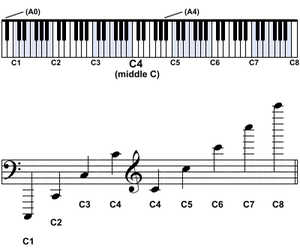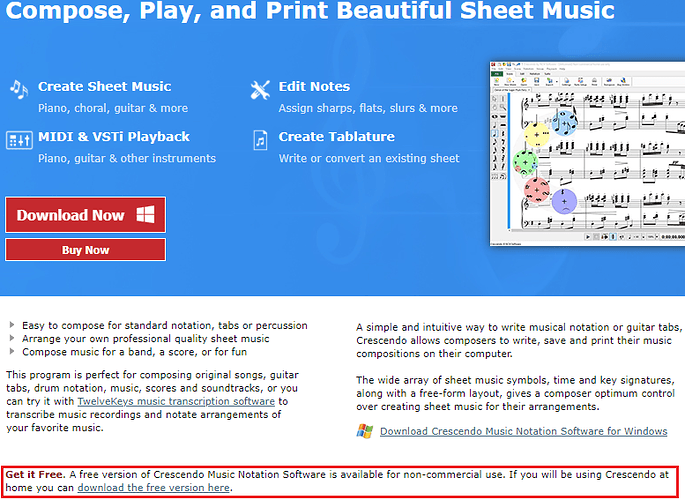Hmmm I thought it was a website… maybe I’m thinking of something else.
Anyway, I’m happy with Crescendo, it has a lot of great features for writing scores.
Crescendo is free for non-commercial use
I’ve never heard of that. Mine expired after the trial so I bought it. I never saw any option for non commercial use.
It does appear to be free for home use. Fineprint in the Crescendo site linked by @PamPurrs
Oh well I don’t mind that I paid for it. It wasn’t that much and it’s great software.
Love it! Sounds like you’ve got a good walking bass line there!
It’s funny, there are certain songs that once I get them down to where I can jam along with the original artist without missing a beat, I tell myself NOW I’m a real bass player. Until a new challenge comes along. 
I’ll have to check out some of those links. Thanks guys! What I do isn’t fancy but it works for me. It’s on a spreadsheet and easy to customize per song. I sing as well so I like to leave space for the lyrics.
Eventually I believe I’ll be reading and writing music instead of just tabs. I’m already writing in rests, bar lines and other notations. Tabs help you learn the notes quickly but not the timing. That’s why I spend so much time jamming along with the song, so I can get the timing down. Still so much to learn! Forever learning 
You got that right, @froghopper01 . . . ![]()
Good luck to you!
(good tabs have timing too :))
I’m doing great regardless 
Some phenomenal musicians never learned to read music. Because timing is crucial for bass players, I’ve become very good at playing along with the drums.
Very good point. Tommy Emmanuel can’t read music, but if there is a better guitarist I can’t confidently name one who is inarguably better.
I use bar lines, rest symbols and even a squiggly line for sustaining a note. Also, the distance between the numbers can help remind you how the rhythm goes to some degree.
Yeah; tabs on better sites like songsterr have note staves and rests just like sheet music 

They convey exactly the same timing info as sheet music; they also convey slightly more note info than sheet music (as by giving you the fret, they give you both the note and the suggested fingering.)
There is nothing wrong with tablature these days, when it comes to conveying how to play a song. The only thing they lack really is rapidly communicating with people playing other instruments (i.e. telling the guitarist “I’m starting out with C and going down to G in the first measure.”) - you need to convert to notes in your head for that.
This assumes you learn the notes on the fretboard yourself too though. You shouldn’t let tabs get in the way of that. You need to know that for when the guitarist tells YOU what to play 
But for charting out a song, tabs are fine, maybe even preferable in some cases if you’re lost trying to find a good fingering.
Learning the notes I’m playing has been very useful when playing with other’s. You need to be able to communicate.
I don’t know how true this is, but Eddie Van Halen claimed in an interview to be the reason tabs exist. He never learned to read music and was a rock and roll Mozart. Other guitarists wanted to emulate him but couldn’t figure out how to write down what he was playing. They created tablature. He also said “music theory is just that, theory. It’s not fact” He said that because he felt if he went by music theory ALONE he never would’ve explored and discovered all the unique and wonderful sounds he got out of his instruments. Not to say reading music or music theory is not important, but to not take it so seriously that it stunts your creativity.
I know there are lots of people who play tab their entire career and that’s okay with me if that’s what they want to do. Personally, I have a very difficult time playing with tab. It slows me down while my brain is having to think about what string and which fret the sheet is telling me to play. When I see a note on a stave, I don’t even have to think about it, my fingers just automatically go where they need to go to play that note.
I equate it to typing: When I type something from a sheet of paper or transcribe from a tape, I see or hear the word and my fingers just type it out. If I had a sheet that said something like, “Strike the 5th key from the left on the bottom row, now strike the 1st key on the second row, now strike the 2nd key from the left on the second row twice…”, it would take forever. I could touch type the word “bass” 6 times while I’m trying to follow those instructions.
That’s just me. I way prefer sight reading over tablature any day, but to each his/her own.
That makes perfect sense for someone who already knows how to read music before ever picking up the bass. Tabs is a great short cut for those of us that see reading music as a foreign language. I’m excited to be in the process of learning to read music. I bet when that lightbulb comes on completely, I’ll probably never go back to tabs. For now it’s like I’m driving a stick shift. One day I hope to be driving the automatic like you Pam! 
I’m happy to use whatever is there. I can read music well enough to learn songs, but there is very little bass guitar sheet music out there for many genres; if you’re lucky, there’s a piano score, but its bass may be a different arrangement so you have to be careful. And also transpose it of course, which is kind of a PITA because the bass guitar range starts way down in the ledger lines on a piano score:

Open E string is E1, the space five ledger lines below on an untransposed score like Piano 
If anyone knows a solid source online for bass guitar sheet music for indie, punk, and post-punk, I would love to know!
I think, and even though it IS a part of it, people conflate theory with sight reading too much. In my opinion sight reading is probably the LEAST important aspect of theory. To me theory is scales, chords, timing, and intervals. Why does a i, iv, v progression sound good (standard 12 bar progression)? Why does the 5th or 3rd sound good over a chord? Why do some notes sound sour? On and on. It’s possible to know this intuitively, and really I still mostly do. That said what I have learned of theory has really helped me along, and I’ve almost entirely ignored the sight-reading side of it. I can sight read…at like 1 BPM lol. So I can’t sight read.
Having that knowledge, I would consider you a step ahead of most. I bet you can pick up and play anything with anyone just by knowing what key, time signature, chord progression, etc.
I’ve only been at it for 2 years. I’m going at it backwards I think. Lol. But I’m having fun! I’m reading and writing tabs, I’ve learned to play and sing close to 40 songs, I’ve written many original bass lines, now to learn theory so I can jam with others! Now that would be a blast.
